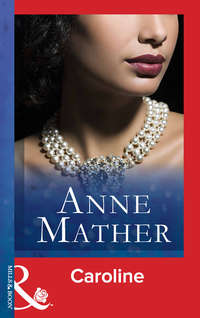
Полная версия
Innocent Invader


Mills & Boon is proud to present a fabulous collection of fantastic novels by bestselling, much loved author
ANNE MATHER
Anne has a stellar record of achievement within the publishing industry, having written over one hundred and sixty books, with worldwide sales of more than forty-eight MILLION copies in multiple languages.
This amazing collection of classic stories offers a chance for readers to recapture the pleasure Anne’s powerful, passionate writing has given.
We are sure you will love them all!
I’ve always wanted to write—which is not to say I’ve always wanted to be a professional writer. On the contrary, for years I only wrote for my own pleasure and it wasn’t until my husband suggested sending one of my stories to a publisher that we put several publishers’ names into a hat and pulled one out. The rest, as they say, is history. And now, one hundred and sixty-two books later, I’m literally—excuse the pun—staggered by what’s happened.
I had written all through my infant and junior years and on into my teens, the stories changing from children’s adventures to torrid gypsy passions. My mother used to gather these manuscripts up from time to time, when my bedroom became too untidy, and dispose of them! In those days, I used not to finish any of the stories and Caroline, my first published novel, was the first I’d ever completed. I was newly married then and my daughter was just a baby, and it was quite a job juggling my household chores and scribbling away in exercise books every chance I got. Not very professional, as you can imagine, but that’s the way it was.
These days, I have a bit more time to devote to my work, but that first love of writing has never changed. I can’t imagine not having a current book on the typewriter—yes, it’s my husband who transcribes everything on to the computer. He’s my partner in both life and work and I depend on his good sense more than I care to admit.
We have two grown-up children, a son and a daughter, and two almost grown-up grandchildren, Abi and Ben. My e-mail address is mystic-am@msn.com and I’d be happy to hear from any of my wonderful readers.
The Innocent Invader
Anne Mather

www.millsandboon.co.uk
Table of Contents
Cover
About the Author
Title Page
CHAPTER ONE
CHAPTER TWO
CHAPTER THREE
CHAPTER FOUR
CHAPTER FIVE
CHAPTER SIX
CHAPTER SEVEN
CHAPTER EIGHT
CHAPTER NINE
CHAPTER TEN
CHAPTER ELEVEN
CHAPTER TWELVE
CHAPTER THIRTEEN
CHAPTER FOURTEEN
Copyright
CHAPTER ONE
THE pearly, early morning light stole like a wraith across the island, lifting the wreaths of mist from the trees, and, as the sun rose higher, gilding the fleecy clouds with a golden glow. Jason had seen many such sunrises, but they never failed to move him by their complete detachment from the toils and rigours of the world they so beautifully illuminated.
Leaning against his balcony rail, he saw the shadows disappear among the palms that fringeed the coral beach, and the white-surfed breakers that creamed on the sand sparkled iridescently. This was the time of day he liked best, when everything was fresh and unspoilt, and for a few hours at least, before Irena awoke, he was free from the sound of her hysterical recriminations.
He looked inland, over the fields of waving sugar cane, the brightness of the crop interspersed here and there by the dark brown thatched roofs of the huts belonging to the plantation workers. Beyond the estate, below the terraces where the white population of the island lived in luxury, was the small town of El Tesoro, the treasure, so called because of the legend that one of the many Spanish galleons, loaded with gold and precious stones, had floundered on the reef on its way to Cordova.
The town, which hugged the small harbour, was densely populated, and living conditions for many of the West Indians were squalid. The birth rate continued to rise and consequently, although Jason tried to help them, little was achieved. Jason's money was tied up in the estate, and besides, they did not always welcome help. They were poor but independent, with the kind of contentment found only among people who have never known the urge for power and money and position in society. At times Jason envied them.
Education was gradually being brought to the people, but as yet the schools on the island accommodated only a small proportion of the children. Those children that did attend were restless and dilatory, only waiting for the bell to be free so that they could swarm into the warm sea, or go out with their fathers in the fishing boats as they had done for generations. Whether it was all worthwhile was a problem that Jason sometimes pondered; would they be happier knowing the outside world and its problems, or was it more sensible to leave them in ignorance to live a life which, if narrow in outlook, was broad in experience?
His family, the Cordovas, had governed the island since the first white settlement was made there over three hundred years ago. Only sixteen miles by twelve at its widest point, it had provided little interest for the French or the English, and gradually the white population had increased and today there were over thirty white families on the island. The rest of the near seventy thousand population was made up of Africans, Indians, and Creoles, with a fair proportion of mulattos amongst them.
During the tourist season, a time Jason abhorred, day-trippers from St. Vincent or Grenada came to the island, but as there were no hotels suitable for their accommodation they were forced to leave at nightfall. For this Jason was grateful. He intended that as far as possible the island should retain its individuality. He wanted no neon-lighted, chrome-plated monoliths turning Cordova into another Martinique or Trinidad.
Jason turned now from his contemplation of the view, and reached for a cigarette which he lit before shedding the white bathrobe which was his only garment. He dressed leisurely in the tight cotton trousers and loose shirt which were the usual garb of the planter at his work. He pulled knee-length leather boots on to his feet and after running the comb through his thick black hair which was over-long and brushed his collar, he opened his bedroom door silently, and crossing the wide landing descended the stairs.
The stairs were marble, as was the mosaic floor of the cool hall below. From this hall, corridors led off to the various regions of the house, while the cooking and servants’ quarters were at the rear of the building in a separate one-storey dwelling. Everywhere was painted white, and at this early hour of the morning the scent of beeswax filled the air. The floors of the living rooms were wood, and Beulah, the African housemaid, polished them religiously until they shone like the polished surface of a table.
Jason walked along the corridor to the dining room which he and Irena used, and seated himself at the long refectory table. His place had been laid as usual, with the fruit and rolls and coffee he always enjoyed at this time. Romulus, the elderly manservant, came to see whether there was anything else he required, but Jason shook his head and the man bowed and left him.
The wide french doors were open, and through them he could again see the beach and the shadowy blue horizon. A breeze blew in, ruffling his hair, and he ran a hand lazily round the back of his neck, stretching for a moment.
His thoughts turned to the argument he had had with Irena the previous evening, and his expression darkened. As always, to mar the beauty of the day, the problem of Irena was fresh in his mind. He finished his breakfast, shrugged his shoulders as though to lift the thoughts that plagued him and, leaving the table, he went out of the french doors and stood on the verandah for a moment breathing deeply. Then he turned and walked round to the rear of the building, where, beyond the pool, and hidden among trees was the stable where he kept his horses. He kept two hunters, and three ponies for the children.
Apollo, his black stallion, was being saddled in readiness for him as he approached, and he patted the horse encouragingly, and produced an apple for it from his pocket, holding it in the palm of his hand, and allowing Apollo to nuzzle the fruit with his soft mouth.
Jacob, the stable boy, stood back to admire his handiwork, and said: “Mucho bello, señor!” in a satisfied voice.
Jason straddled the animal, and nodded down at the boy. “Si, Jacob. Esta bien. Gracias,” and pressing his heels into the animal's sides he rode out of the stable yard.
The air was like wine as he rode down the steep incline to the beach, and then, giving the horse its head, he galloped swiftly along the damp sand. Apollo, sensing his master's mood, sped on winged feet, until Jason slowed him to a canter and finally to a trot. Wheeling the horse round suddenly, he rode up the bank and into the shade of the casuarinas. Dismounting, he flung himself down on the sand and stretched before reaching for a cigarette. After lighting the cigarette he lay back, looking upwards through the tracery of leaves to the blueness of the sky above him. It was going to be another perfect day. Although he had visited many foreign countries in his lifetime, and had attended school in England, nevertheless there was nowhere to compare with Cordova.
But, as always, when he had time to think, his thoughts turned to Irena and the terrible argument they had had the previous evening about Serena and the children. Their arguments of late were always about Serena and the children. If only Antonio were still alive, things would not have been so bad. As it was, with his brother dead, he felt responsible for his brother's widow and their three children.
The children were aged eight, seven and five and urgently needed a governess. The schools on the island were only for the West Indian children. All the white families employed tutors or governesses until the children were old enough to attend boarding schools. If Antonio had been alive things would have been different. He would have seen that the children were properly educated. As it was, Irena's attitude towards Eloise, Ricardo and Marie forestalled Jason from acting in the matter for the sake of a peaceful life. But finally he had decided that he could not be responsible any longer for their education. He had tried to instil a little knowledge into their heads, and although Spanish was the most widely used tongue on the island, the children could speak English quite fluently already so that later they could attend an English school as he had done. But the short time he had to devote to them every day was not enough and mostly they ran wild. Serena, child that she was, had no idea how to maintain discipline, and her indifference only made them worse. If only Irena had been a normal, healthy human being, kindly disposed to her nephew and nieces, she could have done so much for them. But Irena refused to acknowledge their existence except in moments of anger, and although they all lived in the same house, there were two separate households. For Jason and the children the situation was intolerable, and the children were most frequently to be found down in the cane fields, playing with the children of the plantation workers. But now Jason had decided it could not go on. They must be taught; not only elementary lessons but how to behave, before it was too late.
He rolled on to his stomach and stubbed out his cigarette in the sand, watching a sandfly flitting across the ground in search of some interesting article on which to settle himself. Its steady progress was relaxing.
If only Serena had been the daughter of one of the Spanish families here on the island, things might have been different, more tenable. But his brother had married a beautiful young Creole in Trinidad and had brought her back to Cordova. That was nine years ago, and Serena had been sixteen at the time. Irena had been outraged. Although at that time Antonio had had his own house, it had been near Jason's own, and Serena had thought she would be as welcome there as in her own home. In consequence, she had often appeared at the villa while the men were at work, until Irena and she had had such a row that neither of them had spoken since. Serena had been eight months pregnant at that time, and it had disturbed her so much that the baby was premature. For a time it had looked as though both Serena and the baby would die. Miraculously both had survived, but Antonio had not entered Jason's home from the time on. He remained friends with Jason, and Jason was always welcome at their home, but there was no social life between the two families. It had caused quite a stir on the island, and Jason had despised the whole affair.
And now he was faced with a much greater problem, a problem which had grown worse during the two years it had been his. Antonio had been killed while on a business trip to the United States two years ago. He had left Serena a widow with three young children, and little money of their own. Antonio had only worked for Jason. He had not had any share in the company. He had forfeited that years ago when he left home to live in Trinidad.
After Antonio's funeral Jason had told Serena that he wanted the four of them to come and live at the villa. To begin with she had refused, but circumstances had forced her to see reason, and that was how things stood today, except for the fact that he had advertised for a governess, and had obtained one.
“You must be mad! Stark, staring mad!” Irena had raged at him the previous evening, when he had presented her with the fait accompli. “Bringing some strange woman into my house. Isn't it enough that I have to live in the same house as that witch and her brood?”
“Irena!”
“Well! Do you want a stranger in the house? Is there no end to your generosity towards these people …?”
Jason had shrugged expressively. “No, Irena, I do not want a stranger in my home, but those children are turning into savages before my eyes. It's for them I'm prepared to have this woman here.”
“They're savages!” Irena had clenched her fists in fury. Her temper at times was quite uncontrollable, and Jason had tried to pacify her.
“Irena, please! This will be someone for you to talk to. She's been brought up in a convent – surely that's recommendation enough?”
“She's a Catholic?” Irena was curious. “You're sure of this?”
Jason spread wide his hands. “That I can't say. But what else can she be? After all, convents are not run by Protestants.”
“That's true. Nevertheless, Jason, I will not have it. She must go back. You must give her her return fare. You say she's coming from England? She can go back there.”
“No.” Jason was adamant. “In this I refuse to be countermanded. This woman will come and take charge of the children, and you will accept her. Goodness knows, her situation here will be far more difficult than she has any idea it will be.”
Irena had argued for a long time and finally, in weariness, Jason had left her screaming and maligning the fates that had brought her to live in this house.
As he remembered, Jason's fingers sought the scar on his right cheek. A livid thing, it stretched from high on his cheekbone, almost to his jawline. Whenever he was emotionally disturbed, the scar throbbed painfully, and with a muffled oath he got to his feet, determinedly putting all thoughts of Irena out of his mind. There was no more time for soul-searching; it was time to go down to the distillery.
The island's main exports were sugar cane and the rum distilled from the molasses, and Jason himself kept an expert eye on the day's work. It was not always necessary; his staff were reliable and efficient, but it kept him out of the house most days until lunch time and saved him the trouble of trying to find excuses for Irena's ill-temper.
He rode back to the house, and leaving the stallion for Jacob to groom, he went and retrieved the Land Rover from the garage. He drove smoothly down the drive, between the neatly laid-out lawns and flower gardens that Irena found so pleasing, and which the children avoided meticulously. The artificiality of it all did not appeal to Jason; he preferred the rather flamboyant confusion to be found in abundance on the island; bougainvillea rioting gloriously with hibiscus and wisteria; the scarlet beauty of immortelles, the oleanders.
An arched gateway in the high stucco wall which surrounded the villa bore witness to the Moorish influence on all the larger dwellings. Balconies, courtyards, fountains, wrought ironwork; all reflected the Moorish artistry predominant in Spain itself.
The hard track wound down towards the town, its surface throwing a film of dust over the Land Rover. As Jason neared the town, stray animals ran heedlessly across his path, and the colourful African women in there floral cotton dresses became more numerous. Dozens of children swarmed about their legs, and waved excitedly as Jason drove by; they all knew Jason.
Before driving to the Cordova distillery, he drove down to the harbour. This was the only part of the island accessible by sea. A coral reef surrounded the island with only a narrow channel that gave access to the small port of El Tesoro. Here a weekly steamer brought mail and supplies, and the occasional passenger, and in return took the export trade of the island. Besides the sugar cane and run, there was a small bottling and canning plant, which was owned by another of the Spanish families. This was only a small concern, as most of the fruit grown was used by the islanders themselves.
To reach the quay Jason had to leave the Land Rover and walk the remaining distance. Adjoining the quayside was a busy open market, where all the commerce of the island was executed, and he had to press his way through the crowds of early traders and shoppers. The scents of the market, always aromatic and sometimes overpowering, were none the less exciting, and the throng of people and the noise gave him an exhilarated feeling. Everywhere was the feeling of suppressed vitality, a steel band practising for the coming fiesta adding their sound to the din. Sometimes the sound of drums reverberated round the shallow hills above the harbour and the pulsating rhythm fired the blood and stirred the primitive emotions of the body. The African ancestry, superstitious and tribal, brought its own kind of mystery, and Jason knew that many of the practices in the villages owed their origin to the dark gods of Africa. But this was something the white population had to accept, and Jason knew there were few who would go against the voodoo. Its power was absolute.
The harbourmaster's office which was his destination was a low wooden building, occupied by Abe Smith, a massive Negro, with ebony skin and a thick moustache. He and Jason were the best of friends; and Jason usually found time to have coffee with him at this hour of the morning.
He entered the wooden office, stretching as he came through the door. Abe was sprawled in a chair, smoking a cheroot, and he grinned amiably as Jason came in and seated himself on the side of his desk. “Morning,” he said, wrinkling his huge nose. “Coffee?”
Jason nodded and helped himself. “Thanks. I could use some.” After pouring a blue striped beaker full of the black liquid, he turned back to his friend and re-seated himself, idly stirring the brew.
“How goes it?” Abe straightened up, and poured himself another mug of coffee. “Have you told her?”
Jason raised his dark eyebrows. “Yes, I've told her.”
“I can guess what she said!” Abe grimaced, and raised his eyes heavenward.
Jason shrugged. “What I expected I got.” He took a long drink of his coffee, savouring it.
Abe smote one fist into the palm of his other hand. “Madre mia,” he exclaimed, “that woman is not human!”
Jason lit a cigarette. “The governess arrives on the steamer tomorrow,” he remarked, changing the subject.
Abe sighed heavily. “She does, eh? Another woman to cause trouble?”
“Let's hope not.” Jason rose to his feet. “I'll meet her.”
Abe grinned suddenly. “And how will you recognise her? If she's not the only woman to arrive tomorrow?”
Jason bit his lip thoughtfully, and his fingers sought the line of his scar. “She's a governess. My only criterion is the other governesses on the island. She'll be like them.”
Abe chuckled. “Ah, I see! A little grey and long in the tooth!”
“I didn't say that,” replied Jason mildly, his eyes smiling. “But yes, that will suit us very well.”
Abe walked to the door of the office, and leaning against it, his bulk blocking out the light from the room, he said harshly:
“How long is this to go on, Jason? How long are you going to exist in this manner? No one could call it living!”
“Enough,” said Jason, abruptly, but Abe was not to be denied.
“Enough is what you've had,” he exclaimed. “You forget I've known you since you were knee-high! I've seen you change these last fifteen years from a man who laughed and enjoyed life, lived it to the full, to a stranger who interests himself only in his work, in business – must you sacrifice yourself in this way? You need a woman in your bed –”
“Abe!” Jason's face was like carved granite, the scar like a pale slash against the dark tan of his face.
Abe moved away from the door, shaking his head. He was genuinely disturbed for his friend, but Jason could not allow him to say such things. He was married to Irena; she was his wife; if anyone was to blame it was him….
As the steamer Celeste neared Cordova, Sarah wondered for the thousandth time whether indeed she was being as impulsive as Reverend Mother had stipulated. After all, here she was thousands of miles away from England and the convent which had been her home all her life, with nothing to commend this man who was to be her employer but a letter from Father Dominic Sanchez, the Catholic priest on the island.
The solicitors in London who had interviewed her on Jason de Cordova's behalf had seemed singularly out of touch with the situation on the island, and Sarah could only assume that they did not have many dealings with her proposed employer.
But when she had read the advertisement in The Times, it had sounded so exciting and different that she had not thought before replying and offering her services. She was always acting impulsively, and in any case she had been sure there would be so many applications her own would not even be considered. But her application had been considered, and a letter had arrived for Reverend Mother, asking for her references. It appeared her convent upbringing was a recommendation in itself, and Sarah refrained from mentioning that she was not herself of the Catholic faith. She was afraid this would influence her case, for it seemed that this was a Catholic family requiring a governess, capable of teaching three infants elementary lessons. And, she had argued with herself, elementary lessons were not religious instruction, so why should she not be suitable anyway?
It had been too good a chance to miss. The West Indies had long been a place Sarah found utterly fascinating, and to live, even for a short while, on an island there sounded marvellous. Besides, she knew she was fast losing the will to leave the convent, and that if she did not leave soon she would never leave at all. Orphaned as a baby and adopted by the nuns at St. Teresa's, Sarah had found a home so completely understanding that many times she had been tempted to become a novice herself. But her parents had not wanted it and the nuns refused to let her decide until she was over twenty-one. They had sent her to a training college in the town after she left school, and she had become an infant teacher. Then she had returned to the convent school and taught the pupils there for the last eighteen months.











